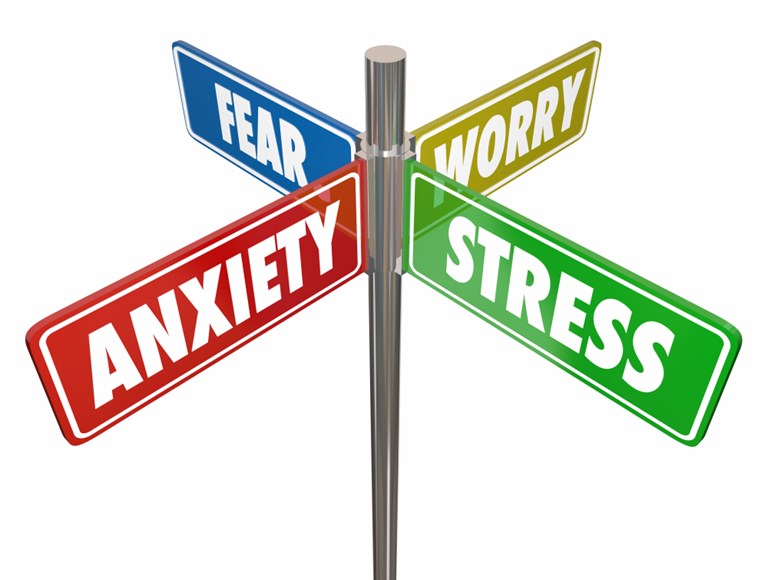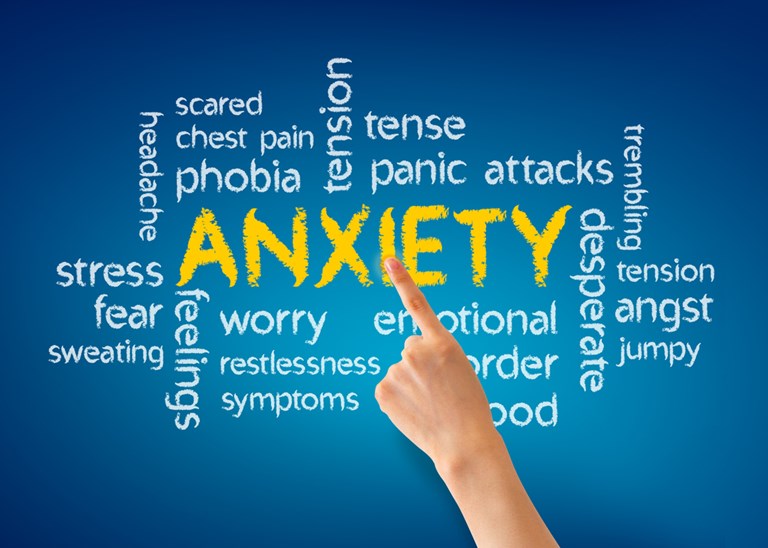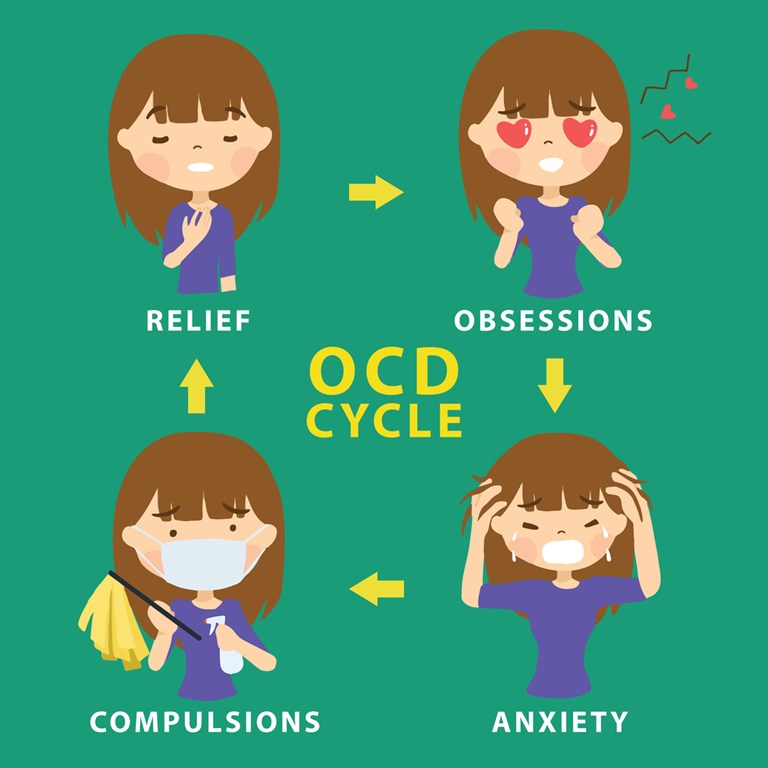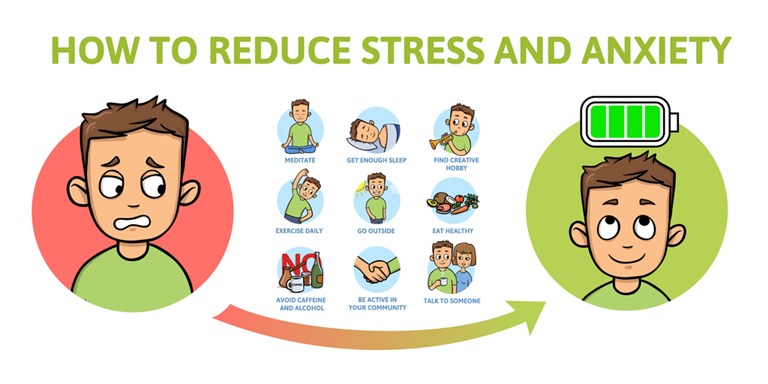Everybody has been anxious at some point in their life. It’s normal to feel anxious sometimes. It’s how we respond to feeling threatened, under pressure or stressed that can leave us feeling worried and uneasy. Whilst these emotions often pass quickly, there are many ways to manage them when they appear. Although anxiety is common, if you feel that it’s affecting your quality of life then it might be time to take action and speak to your doctor.
What is anxiety?

Anxiety isn’t necessarily a bad thing. It can spur us on, help us stay alert, make us aware of risks, and motivate us to solve problems. However, when you’re anxious, you might be unable to relax which can lead to trouble sleeping. Some people experience ‘situational anxiety’ which occurs in response to a specific situation, such as a performance, exam, or job interview, whilst others experience ‘generalised anxiety’ about a variety of issues and situations, rather than a specific event. There is more information about situational anxiety, which is very common, and how to face your fears on the Pharmacy2U website.
Whilst it’s normal to feel anxious from time to time, prolonged and persistent periods of feeling anxious can make life more difficult and stressful. If you are frequently experiencing intense and excessive worry about daily situations and this is interfering with your quality of life and ability to cope, you might be living with an anxiety disorder. If this is the case, you might want to take steps to manage your anxiety or think about talking to your doctor.
Anxiety symptoms

The symptoms of anxiety can affect both your body and mind, and can be experienced differently by different people.
Some common effects on your mind can include:
- Feeling tense, nervous and tearful
- Having a sense of impending danger or panic
- Being unable to concentrate on anything other than your worries
- Having the urge to avoid things that trigger your anxiety
- Feeling irritable
Some common effects on your body can include:
- Feeling restless and being unable to relax
- Experiencing trouble sleeping and feeling tired and weak
- A fast or irregular heart rate
- An increased breathing rate (hyperventilation)
- Sweating
- Trembling
- Gastrointestinal and stomach problems
- Loss of appetite
- Feeling sick
- Dizziness or light-headedness
- Headaches
- Chest pains
More information on anxiety symptoms can be found on our website.
What are anxiety disorders?
Whilst it’s normal to feel anxious on occasion, if it’s affecting your day-to-day life then it is worth seeking help. To reassure you, mental health problems including anxiety are very common. According to the charity Mind, 1 in 4 of us experience a mental health problem of some kind each year in England.
Listed below are the most common types of anxiety disorder, all of which can be helped by different forms of treatment.
Generalized anxiety disorder (GAD)
You might be living with GAD if you feel persistently and excessively worried about daily activities and events, such as your job and social life. GAD can be difficult to diagnose but if you are worrying uncontrollably and this is making you stressed and upset, this could be how it is diagnosed. Feeling worried on most days for many months as well as thinking the worst in situations are other signs of GAD. Other symptoms can include irritability, difficulty concentrating and a sense of dread. Physically it is linked to many symptoms including restlessness, dizziness, heart palpitations, dry mouth, headaches, and stomach aches.
Separation anxiety disorder

Separation anxiety is very normal in early childhood. Nearly all children between the ages of 6 months and 3 years old have separation anxiety and are clingy to some degree. Whilst most children grow out of it, some might experience prolonged separation anxiety. It is most common in children, but it can occur in teenagers and adults.
Separation anxiety disorder is diagnosed when symptoms are excessive for someone’s developmental age, causing significant distress and making daily functioning difficult. Signs of separation anxiety disorder include recurrent and excessive distress about being away from home or loved ones, including refusal to stay away from home or being there without a loved one. Someone living with separation anxiety disorder might also worry excessively about losing a loved one to illness or a disaster, or being separated from them due to being lost or kidnapped. Headaches, stomach aches or panic attacks can also occur in response to separation or in anticipation of this.
Social anxiety disorder/phobia
Some people experience high levels of anxiety and fear related to social situations due to feeling embarrassed or self-conscious. They also worry about being judged or viewed negatively by others which can lead to them avoiding social situations or places where they know people will be. Social anxiety disorder impacts someone’s ability to meet new people, apply for jobs, answer a question in class, or talk to sales assistants in shops. Eating or drinking in front of other people or using a public toilet or changing room also causes fear of humiliation or judgement.
People living with social anxiety disorder can experience multiple physical symptoms such as feeling sick, avoidance of eye contact, blushing, sweating and a rapid heart rate.
Panic disorder
Panic disorder results in a pronounced physical response to anxiety, termed a panic attack. People might experience chest pain, heart palpitations, shortness of breath, dizziness, and abdominal pains. These episodes of intense fear and panic attacks can occur expectedly or unexpectedly, and if they happen repeatedly, it is termed a panic disorder. Those living with panic disorder fear panic attacks and sometimes avoid places and situations where they have experienced them in the past.
Although panic attacks are frightening, they're not dangerous. An attack will not cause you any physical harm, and it's unlikely you'll be admitted to hospital if you have one. They tend to pass in 5 to 20 minutes but can last for longer.
Be aware that most of these symptoms can also be symptoms of other conditions or problems, so you may not always be experiencing a panic attack.
Obsessive compulsive disorder (OCD)

OCD is a common and long-lasting disorder where a person has obsessive thoughts and compulsive behaviours. These compulsions can include excessive cleaning and handwashing, arranging things in a particular way, repeatedly checking appliances are off, or compulsive counting.
An obsession is an unwanted and unpleasant thought, image or urge that repeatedly enters your mind, causing feelings of anxiety, disgust or unease. These obsessions can relate to fears of germs or contamination, or a need to have things symmetrical and in order.
People with OCD generally can’t control these thoughts or behaviours and can spend at least an hour a day thinking about them. Performing the behaviours doesn’t give them pleasure, but it can briefly make them feel less anxious.
Post-traumatic stress disorder (PTSD)
PTSD can develop after experiencing or witnessing a life-threatening event, such as a fight, natural disaster, car accident or sexual assault. The fear and lack of control people feel during these events can cause them to develop symptoms that decrease their ability to function and cause significant distress.
People with PTSD have intense, disturbing thoughts and feelings related to their experience that last long after the traumatic event has ended. Certain noises or situations can lead to strong negative reactions, and they will often feel sad, scared and angry. Many people with PTSD avoid situations or people who remind them of the event, which they often relive through flashbacks and nightmares. For a person to be diagnosed with PTSD, these symptoms would usually have been happening for at least 4 weeks after the traumatic experience.
Agoraphobia
Some people fear and avoid situations that might cause them to feel trapped, helpless, or embarrassed, or where help wouldn’t be available if things went wrong. People living with agoraphobia tend to experience this for six months or more. Their anxiety is disproportionate to the actual danger of the situation and can lead to avoidance or the need for a companion. Situations that can cause fear or avoidance for people with agoraphobia include:
- Using public transport
- Being in open or enclosed spaces
- Standing in line or being in a crowd
- Being outside of their home alone
Specific phobias
Everyone is different, and for some people, certain objects, situations, or activities that aren’t generally harmful can cause excessive, irrational, and persistent fear. People with a specific phobia can find them extremely distressing and they’ll often go to extreme lengths to avoid their fears. Common phobias include spiders, public speaking, and flying.
The symptoms of all phobias are similar, and they can include physical reactions, such as sweating, increased heart rate, a tight chest or difficulty breathing.
How long does anxiety last?
The length of time someone feels anxious for is highly variable and depends on the individual and the severity of their anxiety. In response to certain life events and situations, most people experience short spells of anxiety, however, for people living with an anxiety disorder, this feeling can last for some time. If the anxiety you feel is persistent and overwhelming, impacting your day-to-day life, it is less likely that it will just pass. These anxiety disorders can last until you seek treatment and should be discussed with your doctor.
Some anxiety disorders involve panic attacks. These tend to last between 5 and 20 minutes but they can leave you feeling drained and anxious for several hours after. Panic attacks have clear, intense, physical symptoms, such as feeling sick, heart palpitations and trouble breathing. They trigger the ‘fight or flight response’ which is not meant to last very long.
Ongoing anxiety does not involve ‘fight or flight’, so whilst you might experience similar symptoms, they tend to be milder. Symptoms may include a racing mind and worries that stop you from sleeping and focusing on other tasks. Ongoing anxiety is less intense than a panic attack, but it can last for hours at a time or linger for weeks and months if it is due to an anxiety disorder.
How to manage anxiety
The good news is, whilst anxiety is highly unpleasant and can feel like it will never go away, there are many things you can do to make yourself feel less anxious, ranging from physical acts to treatments and therapies.
How to lower your anxiety

Before trying certain treatments and therapies to help lower your anxiety, you should try some other things that can help. These include:
- Exercising
- Going for a walk
- Meditating and yoga
- Sleeping and resting
- Limiting alcohol and caffeine
- Talking to someone about how you feel
- Trying to maintain a positive attitude; use positive affirmations
- Guided meditation videos on Youtube
- Spending time with friends and family who make you feel good
- Doing your best rather than striving for perfection
- Prioritising self care – read a book, eat well, take a bath, have a massage
- Taking deep breaths
All of these can boost your mood and mind and help you to order your thoughts. They can make you feel calmer, as well as providing a good distraction from the things that are making you feel anxious. There are lots of methods and treatments to help lower your anxiety on our website.
Anxiety treatments and therapies
Your doctor may prescribe medication to help you to manage your anxiety or suggest a certain form of therapy.
It is likely that psychological treatments will be recommended before trying medication, such as:
- Cognitive behavioural therapy (CBT)
CBT is one of the most effective treatments for anxiety disorders. It usually involves meeting with a specially trained and accredited therapist for a 1-hour session every week for 3 to 4 months. These sessions help you to identify how your thoughts and emotions can influence your actions. This can involve focusing on specific problems and changing the way you deal with them. The hope is that changing the way you think, changes the way you feel and ultimately changes the behaviour.
- Applied relaxation
Applied relaxation focuses on relaxing your muscles in a particular way during situations that usually cause anxiety. The technique required to relax your muscles is taught by a therapist who you would usually meet for a 1-hour session every week for 3 to 4 months. By learning to relax your body in a new way, you might find it easier to deal with situations that make you anxious. It can also help you to fall asleep more easily if you are anxious.
- Exposure therapy
This is a form of CBT that involves identifying the things that cause your anxiety and then, in a safe setting, exposing yourself to them gradually, virtually or in real life. By doing this in a safe setting the aim is that you begin to feel less anxious about it and also realise that you can manage and cope with the situation. This form of treatment tends to be short term and requires fewer sessions.
- Dialectical behavioural therapy (DBT)
This is another form of CBT in which you learn new skills to manage your emotions and balance opposing thoughts. In DBT, you work to resolve the apparent contradiction between self-acceptance and change to bring about positive outcomes. It focuses on mindfulness, distress tolerance, emotion regulation, and interpersonal effectiveness. This increases your tolerance of negative emotion and allows you to better manage it. It also allows you to better communicate the way you feel to others in a way that maintains your self-respect and strengthens your relationships.
DBT can be conducted in several ways, in a group, individually, or over the phone. In all settings, a therapist teaches you behavioural skills that can be adapted to personal life challenges and difficult situations.
There are also supplements and mood therapy products that you can take, without a prescription, that can help you to relax and feel calm.
- Acceptance and commitment therapy (ACT)
ACT is a form of therapy in which you learn to stop avoiding, denying and struggling with your inner emotions. It teaches you how to accept that your feelings are a valid response to certain situations but that they shouldn’t control your life. With this form of therapy, you commit to facing the problem and your stresses head-on, rather than avoiding them. ACT combines acceptance and mindfulness techniques with commitment and behaviour change strategies to allow you to feel stronger and more flexible mentally.
Therapists will help you to recognise how suppressing and controlling your emotions creates challenges, and how these can be addressed. Through identifying and accepting your feelings you are then able to practice and change your self-talk and behaviours and not avoid situations where these feelings are involved.
- Psychoanalytic therapy
This is a form of talking therapy in which a therapist helps to bring subconscious or deeply buried thoughts and feelings to the surface. This allows repressed experiences and emotions, which could be contributing to or causing an anxiety disorder, to be examined. Once these have been identified, your therapist can help you to look at how these repressed early memories might affect your thinking and behaviours and how you can deal with them.
The length of time psychoanalytic therapy is required depends on the depth of the experience being explored. It can take a few weeks, or it can take years, to fully explore these buried thoughts and feelings.
Medication
If the treatments above aren’t helping, or you don’t feel comfortable trying them, your doctor may discuss a prescribed medication with you. Some of these are to be taken long term whilst others are taken on a short-term basis. Your doctor will discuss this with you and decide what is the best fit for you based on your symptoms. Common medications prescribed in the NHS for anxiety include:
- Benzodiazepines, such as diazepam. These drugs help to treat symptoms of agitation, distractibility, and racing thoughts, and are also used to help those with bipolar disorder. They should only be taken for short periods of time.
- Selective serotonin reuptake inhibitors (SSRIs), such as sertraline, citalopram and fluoxetine. These are classed as antidepressants and work well for anxiety as well, by increasing serotonin levels in the brain.
- Serotonin-norepinephrine reuptake inhibitors (SNRIs), such as venlafaxine and duloxetine. SNRI’s are another form of anti-depressant and act on serotonin and noradrenaline levels.
- Beta-blockers, such as propranolol. These are typically prescribed to reduce the physical symptoms of anxiety, for example, slowing down a fast heart rate.
Why does anxiety return sometimes?
Even if you find ways to manage your anxiety, certain situations can cause your feelings to re-emerge. Typically, these are situations that are generally stressful or cause you to feel low or tired. They include:
- Financial issues
- Problems at work or at home
- Concerns over your personal safety
- Concerns over a loved one
- Serious health issues
- Fears of being alone
- Fears about the return of your anxiety
It is normal for your anxiety and stress levels to fluctuate throughout your life depending on what you’re going through and how you feel mentally. If you find your anxiety returning you should engage in behaviours that have helped you to manage it in the past or try a different strategy.
When to see a doctor for anxiety
If you are living with the symptoms of any of the anxiety disorders listed above, and it is impacting your day-to-day life and you are concerned about the way that you are feeling, you should see your doctor. You don’t need to wait for your symptoms to worsen or to see if they go away or change. For people who have been feeling anxious for over 6 months, talking to your GP is important as it is likely that they will be able to do something to help you. If you feel more comfortable doing this virtually, you can visit our online doctor for help with situational anxiety.
External resources
The NHS has advice and help for anxiety as well as a Mind Matters questionnaire with personalised tips and advice.
Mental health charity, Mind, also provide useful information about managing anxiety, as well as a helpline where you can talk to someone about how you are feeling and get help.


